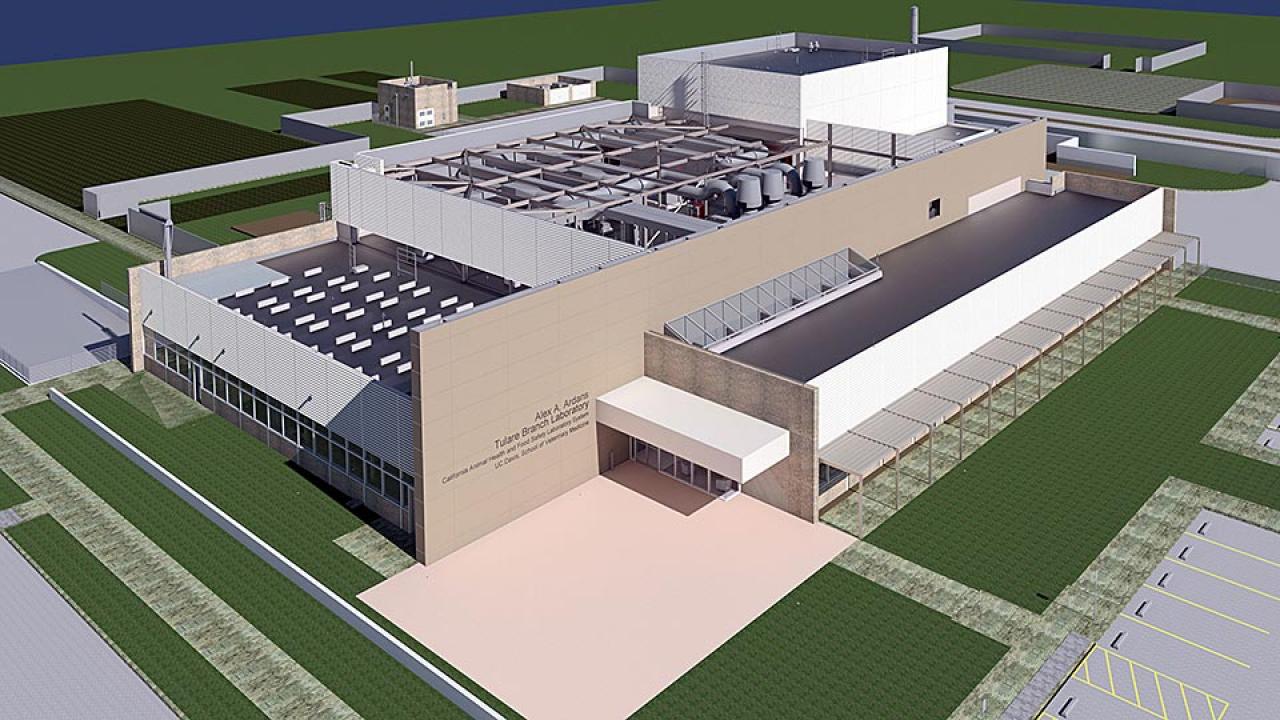Quick Summary
- Diagnostic lab at ‘front line’ in protecting nation’s food supply
- New facility is a $49.4 million state-funded project
- Lab named for UC Davis leader in veterinary diagnostics
A new diagnostic laboratory devoted to protecting farm animals, the food supply and the public against new and emerging diseases will be dedicated Friday, Oct. 28, in Tulare by the UC Davis School of Veterinary Medicine and the California Department of Food and Agriculture.
The Tulare facility is one of four labs in the California Animal Health and Food Safety Laboratory System, headquartered at UC Davis and operated for the state by the veterinary school to protect animal health and performance, and safeguard public health and the food supply.
“California is proud to be home to the largest and most diverse agriculture in the world,” said Karen Ross, secretary of the Department of Food and Agriculture. “As we dedicate this new laboratory in Tulare we are reminded that skilled scientists with state-of-the-art diagnostic equipment are truly at the front line, working with farmers, ranchers and veterinarians to protect the safety and security of our nation’s food supply.”
The new facility, which is a $49.4 million state-funded project, will be named in honor of the lab system’s founding director and Professor Emeritus Alex A. Ardans, who led the statewide diagnostic service for 21 years.
“It is quite fitting as we celebrate the construction of the new Tulare lab that we also honor Dr. Ardans, whose vision and many years of wise leadership enabled the statewide laboratory system to become a national leader in detecting and preventing livestock and poultry diseases,” said Michael Lairmore, dean of the UC Davis School of Veterinary Medicine.
About the Tulare lab and statewide system
The new 29,000-square-foot laboratory is located adjacent to UC Davis’ Veterinary Medicine Teaching and Research Center, just east of Highway 99 and about 8 miles south of the city of Tulare.
When fully equipped, the lab will provide rapid detection and response to both routine illnesses and catastrophic, emerging animal diseases. Testing will be available for livestock, poultry and horses.
In addition to the Tulare lab and the central diagnostic lab at UC Davis, the statewide laboratory system has branch labs in San Bernardino and Turlock.
The Tulare laboratory is under the leadership of Branch Chief John Adaska, and the California Animal Health and Food Safety Laboratory System is led by Director Pam Hullinger, recently appointed following the retirement of former Director Richard Breitmeyer.
Statewide diagnostic successes
The new branch lab will build on a long history of successes achieved by the statewide laboratory system including:
- Diagnosing exotic Newcastle disease among backyard chickens in 2002, which led to a $168 million state-federal eradication effort;
- Minimizing the cost of that outbreak and hastening the reopening of international markets by helping to develop a high-throughput test for exotic Newcastle disease;
- Detecting California’s first case of atypical BSE (bovine spongiform encephalopathy), or mad cow disease, in 2012 and helping to keep trade markets open for the state’s beef industry by demonstrating the effectiveness of the BSE surveillance program; and
- Playing a major role in limiting the spread of avian influenza in 2015, as the U.S. experienced its worst outbreak of the disease among poultry in history.
In 2015, the statewide laboratory system conducted more than a half million diagnostic tests.
Ardans a leader in veterinary diagnostics
As a veterinary researcher and former director of the statewide laboratory system, Alex Ardans is nationally and internationally respected as a leader in veterinary diagnostics. His research interests included viral diseases of livestock and development of veterinary diagnostic aids for viral diseases.
He played a major role in working with the California Department of Food and Agriculture to restructure and revitalize the state diagnostic laboratory system and create the California Animal Health and Food Safety Laboratory System. He was named the founding director of the lab system in 1987, a position he held until his retirement in 2008.
Ardans also worked to focus the lab’s expertise on the problem of fatal injuries among racehorses and to identify prevention methods through the California Horse Racing Board Postmortem Program.
In addition, he participated in drafting legislation and developing a program for racehorse drug testing through the laboratory system's Equine Analytical Chemistry Laboratory.
He also has played a national role in the accreditation and improvement of other diagnostic laboratories throughout the United States.
Ardans received his doctor of veterinary medicine degree from UC Davis in 1965 and a master’s degree in virology from the University of Minnesota in 1969. He joined the faculty of the UC Davis School of Veterinary Medicine in 1969, where he successfully taught the next generations of veterinarians and conducted important research to advance animal health.
Throughout his career, Ardans remained current with the needs of agriculturists by actively participating in a number of organizations including the California Woolgrowers, Pacific Egg and Poultry Association, California Poultry Industry Federation, Pork Producers, California Cattlemen’s Association, American Association of Veterinary Laboratory Diagnosticians and California Veterinary Medical Association.
Media Resources
Pat Bailey, UC Davis News and Media Relations, 530-219-9640, pjbailey@ucdavis.edu
